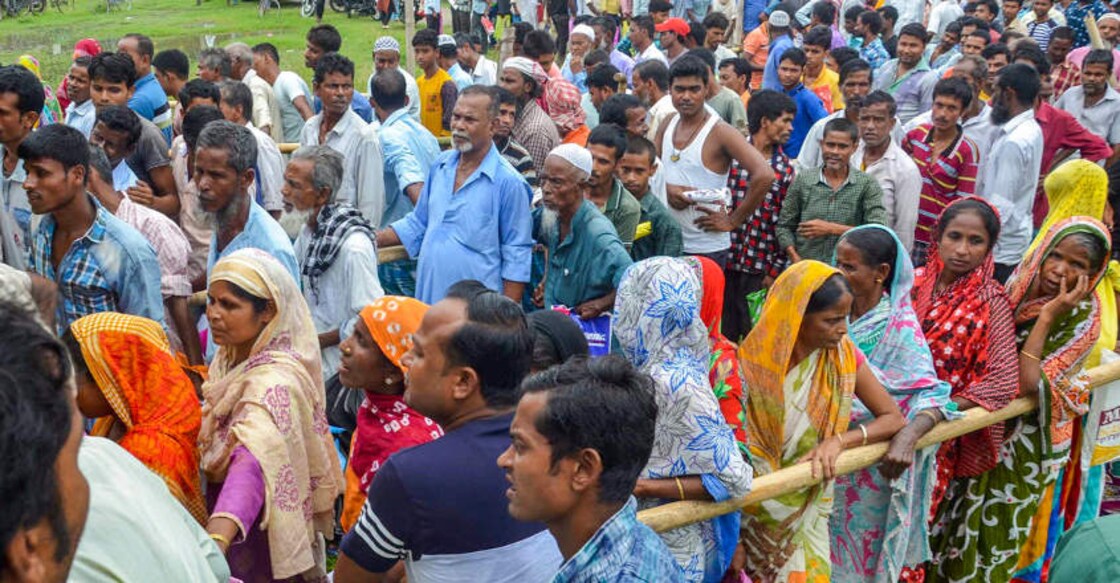NRC: An exercise that could fracture India's socio-political fabric

Mail This Article
The National Register of Citizens (NRC) update in Assam has been occupying centre space in the recent political and apolitical discourses. The NRC update in Assam was originally conceived to identify, detain, and expel people found to be 'illegal immigrants.'
The Assam Accord of August 15, 1985, that ended a widespread six-year agitation, provided the verification programme political as well as local acceptance. The updated draft list, published on July 30, 2018 leaves out about 40 lakh individuals claiming to be citizens and currently residing in Assam.
Some prominent citizens and their kin, too, have found themselves excluded. Assurances by the government of adequate redressal and remedies notwithstanding, various political parties were quick to level allegations of vested interest and political mining against the Centre.
Emotional criticism and allegations apart, the process has been chugging along steadily under the mindful eyes of the honourable Supreme Court of India. Encouraged by the prospects of political mileage that it could elicit, the idea of extending the NRC exercise across the country is slowly gaining traction.
But the statements of senior functionaries of both the Government of India and the ruling party are testimony to the fact that the NRC update will not actually achieve the stated goals.
On the other hand, it may end up only in disenfranchising a set of people including some genuine Indian citizens. That is where an apolitical activity actually threatens to become political in execution; the prime reason against which all parties in the opposition have raised their voice.
Assam has been struggling with the issue of illegal immigrants even before independence. In the beginning, it was an issue of survival and sustenance of the natives, their livelihood, culture and traditions threatened by the swarming mass of illegal migrants and refugees. As time passed, threat to national security from illegal, radical and inimical immigrants grew.
Action plan lacking
The NRC update would have ideally served the purpose if there was a definite action plan to deport those individuals declared illegal immigrants. When no country, including Bangladesh, has agreed to accept a population declared illegal by India, we would have no option but to hold them in geographically demarcated areas or detention centres, in pursuance of its original objective.
With repeated assurances coming from the highest governmental offices as well as the President of the ruling party that such people have nothing to fear, it clearly relegates the NRC update to an exercise aimed at trimming electoral rolls. Merely identifying someone as a foreigner with the sole intent of disenfranchising him or her does not serve the purpose for which the update was initiated at the first place. Social, cultural and economic aspects that were the root causes of the Assam agitation thus remains unaddressed.
Illegal immigration
Illegal immigration can be a problem to any country and India is no exception. Immigration policies cannot be discriminatory. By no means, it is advocated that illegal immigrants be allowed in the country. While Hindu illegal immigrants are said to be acceptable and would be considered for citizenship, Muslim illegal immigrants would effectively be disenfranchised and denied citizenship. Thus, religion-based exclusion seems to be the driving force.
There is also a growing chorus among the self-proclaimed nationalists to extend the NRC update across the country under a 'One India' vision. The political double standards of this proposal become evident, especially in the light of the fact that the ruling party has been in coalition in J&K where 'One India' vision doesn't apply. While such a proposal may be appeasing to ultra-nationalists, it may eventually end up fracturing the socio-political fabric of a peaceful country.
(Jacob Tharakan Chacko is a retired major-general with 36 years of experience at various managerial and directional posts. He is a recipient of the Sena Medal. He may be reached at: jacobtharakanchacko@gmail.com)


